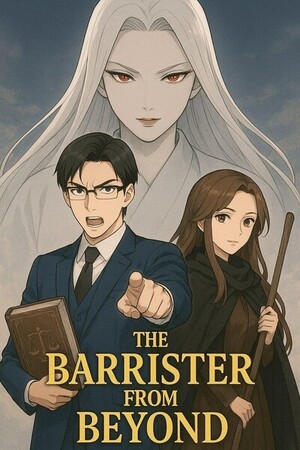Chapter 33:
A Case From The Past
The Barrister From Beyond
I lay in bed, my eyes open and fixed on the ceiling. The room was immense, carved from dark, somber stone, a trophy chamber in the heart of the enemy's fortress. Fredreich hadn't put me in a dungeon; he'd placed me in a magnificent cell, complete with silk sheets and an iron bar on the window that was thicker than my arm. "What exactly was Fredreich's plan?" I thought to myself. "Bore me to death? Show off his wealth before he kills me?" I twisted and turned. The heavy silence of Kaisergrad pressed down on me. Sleep never came, a familiar, unwelcome guest during times of extreme stress.
I got up, the floor cold beneath my feet, and leaned against the granite window frame, staring out at the slumbering city. The black glass reflected the dim light of the oil lamp, catching the faint sheen of sweat on my forehead. This chamber, vast and cold, was Fredreich's gilded cage for me. Yet, the feeling was achingly familiar. It reminded me of the nights I used to spend in my cramped, eleventh-floor apartment back in Tokyo, mentally preparing myself for a big case. The scale had changed. It was the fate of a kingdom instead of the fate of a single life, but the underlying psychological pressure was identical.
In the legal world, just as in the military one, you had to anticipate the opponent's winning argument. Fredreich's argument was power and righteous vengeance. My counter-argument, the only one that mattered, was buried deep within the logic of my past. I closed my eyes and let the present danger dissolve, allowing the cold dread of an old case to take its place.
My mind drifted back. It was five years ago. I wasn't fighting for Queen Ambrose, but for a small, singular truth.
The case was The State vs. Shigeru Takeda. I was the lead prosecutor, then only in my twenties, burdened with the monumental task of proving beyond a reasonable doubt that Takeda, a quiet, middle-aged accountant with no prior record, had sexually assaulted a young woman. The case had become a media circus because of the defendant's standing in the community and the perceived weakness of the evidence.
The core of the prosecution’s case rested almost entirely on the victim’s traumatic testimony. We lacked the unshakable material proof (shoˉmei) that Japanese criminal courts traditionally demanded, especially when the defendant maintained a polite, composed demeanor. The political pressure from the local conservative press was suffocating, framing the victim as an opportunist seeking to capitalize on a consensual encounter, and me as a young, ambitious prosecutor willing to ruin an upstanding man’s life for a promotion.
I remember sitting in the prosecutor’s office that week, the fluorescent lights humming overhead in the late hours. I had mountains of paperwork, but the only thing that mattered was the weight of the victim’s tearful testimony. My opponent, the legendary defense attorney Masami Hirano, was a master of exploiting the system’s caution. He didn't argue that Takeda was innocent; he simply argued that the state's case lacked the absolute certainty required for conviction, thereby preserving the social harmony that the court prized above individual justice. Hirano was smooth, charismatic, and had a reputation for turning victims into unreliable narrators with quiet, devastating precision. He was, in his own way, a legal analogue to Fredreich.
“He didn't need to lie overtly,” I muttered to the empty room of my past, pacing my small space, sipping coffee so black it tasted like ash. “He just needed to plant the seed of doubt in the jury’s mind to preserve his narrative.”
Hirano’s entire defense strategy was built on an alibi of convenience. Takeda claimed he was at a local bar, the Izakaya Yume, at the exact time of the assault. The owner, a friend of Takeda’s family, offered vague corroboration. It was enough to create "reasonable doubt," the shield behind which Takeda intended to walk free and continue his life unpunished.
I knew, deep in my gut, Takeda was guilty. The subtle inconsistencies in his pre-trial statements, the way he avoided looking at me during preliminary hearings, these were markers of a lie I had learned to recognize. But gut feeling couldn't win the case. If I lost, it wasn't just a loss of a single conviction; it was a devastating setback for every victim who had placed their trust in the system. It was a failure of the ethical justice I believed the law was meant to uphold, a failure that would scar me forever.
The central piece of Hirano’s defense, the unmovable object, was the alibi. The assault was reported at 6:30 PM. Takeda claimed to have arrived at the bar at 7:15 PM. Hirano's narrative accounted for the forty-five-minute gap by saying Takeda was "checking his phone and composing himself" after a particularly stressful workday before going to the bar. It was a plausible, human detail designed to deflect suspicion.
I spent hours staring at the map of the district, tracing the two-kilometer route between Takeda's apartment and the Izakaya Yume. The fastest possible travel time on foot was about 45 minutes, or 25 minutes by a highly improbable taxi ride given the time of day.
6:30PM+45minutes(walk)=7:15PM. The math, by itself, checked out. The delay was exactly the time it would take him to walk there.
But why the elaborate twenty-minute emotional break story? If he was walking directly, why add the unnecessary fictional layer? The very act of adding a lie, regardless of how minor, was a sign of concealment. It was the same principle that Fredreich was using now: trying to mask his true motive with an elaborate, false narrative of "border security."
I pushed the official police reports aside and pulled out the thick file labeled 'Physical Evidence: Local Surveillance.' Police had, as standard procedure, gathered every feed within a ten-block radius. The amount of video data was staggering: banks, parking garages, and dozens of convenience stores (konbini), the omnipresent sentinels of Japanese urban life.
I knew the key was buried in the mundane. Hirano, convinced by his own powerful legal rhetoric, would never have bothered to examine the routine details. He was focused on the grand sweep of the argument, blind to the quiet, damning truth hidden in the small spaces.
I began my slow, methodical search through the surveillance logs, specifically focusing on the main routes Takeda would have taken. I was looking for the flaw in his assumed "twenty-minute composition" time, the moment when Takeda’s actions contradicted the defense’s elegant narrative. The fate of the case rested on finding the logical error that Hirano’s arrogance had left exposed.
The night wore on, the neon signs of Tokyo bleeding through my small window. I was fueled by cheap instant coffee and the memory of the victim’s pale face. This wasn't just about winning; it was about proving that even against the most powerful, most convincing narratives, the truth, the unmovable piece of evidence, could still prevail. Fredreich, I knew, was relying on me to believe his demands for surrender were inevitable. I would find his konbini camera, and I would break his lie.




Please sign in to leave a comment.